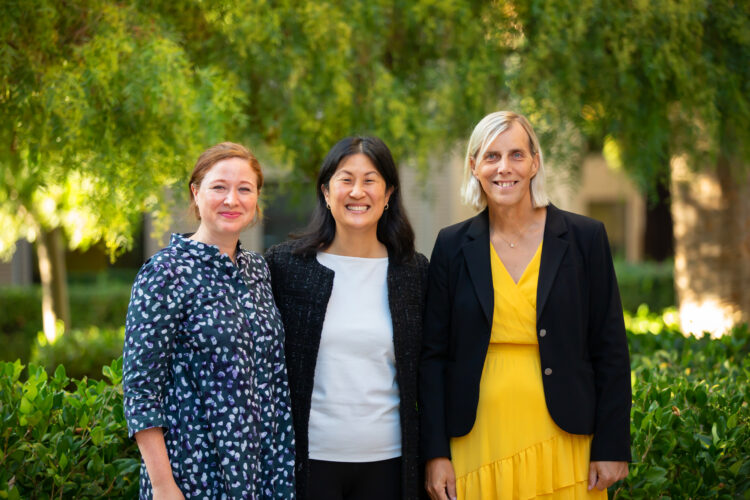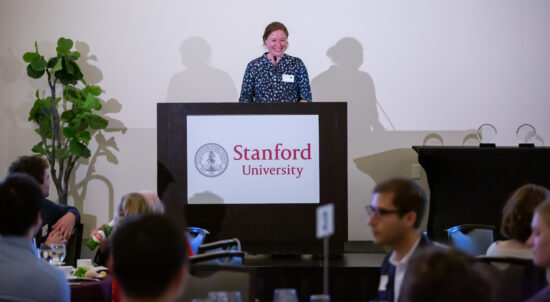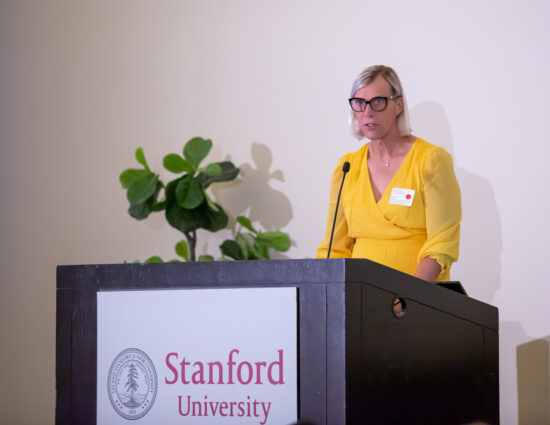During a dinner and awards ceremony on October 16, the John and Terry Levin Center for Public Service and Public Interest Law at Stanford Law School (SLS) honored two attorneys for their commitment to public service. Approximately 140 members of the SLS community attended the annual event.

Maggie Filler, JD ’12, an attorney with the U.S. Department of Justice’s Civil Rights Division in the Special Litigation Section, received the Miles L. Rubin Public Interest Award. Filler works to protect the rights of people incarcerated in state and local prisons and jails. Named in honor of SLS alumnus Miles L. Rubin JD ’52 (BA ’50), the award is given annually to an SLS alumnus/a whose outstanding work has advanced justice and social change in the lives of vulnerable populations on a community, national, or international level. The Rubin Award highlights concrete and sustainable approaches and solutions to a societal problem.
Sasha Buchert, director of the Non-Binary and Transgender Rights Project at Lambda Legal, received the National Public Service Award, which honors an attorney whose work on behalf of the public has had national impact.
Interim SLS Dean Robert Weisberg, Edwin E. Huddleson, Jr. Professor of Law, welcomed the attendees and introduced Rubin and his wife, Nancy. In addition to the annual public interest award, the Rubins also helped establish Stanford Law School’s Loan Repayment Assistance Program (LRAP), which provides student debt relief for lawyers who pursue careers in public service.
Maggie Filler: Miles L. Rubin Public Interest Award Winner
Filler used her remarks to encourage all SLS students to remember that no matter the career path they choose, whether law firm, government or non-profit work, they will have many opportunities to do public interest work. She also reminded students of the vast network of SLS grads doing public interest work across the country. “Collaboration is core to human survival and even at our most difficult times, we can share the lows and find our strength in connection with other people,” she said “The most personally fulfilling experiences I’ve had in my legal career have been when I’ve been a member of a high-performing team united by common goals, trust, and respect. So, my challenge to you all is to find your collaborators in the public good. They may be sitting around you in this very room tonight. Support them, learn from them, and together do the work that lies ahead.”

Prior to joining the DOJ, Filler was an attorney with the Roderick and Solange MacArthur Justice Center in Chicago, Illinois, and a clinical fellow with the Northwestern Law School Bluhm Legal Clinic. At MacArthur, she focused her practice on pursuing justice for those wrongly convicted of serious crimes and on strategic litigation on behalf of persons who endured years of extreme solitary confinement in prisons across the country. Filler also previously worked at Prisoners’ Legal Services of Massachusetts, a statewide legal services organization for persons incarcerated in Massachusetts jails, houses of correction and prisons.
‘What Kind of Impact Can You Have?’
Anna Wang, associate dean for public service and public interest law, offered brief remarks during which she echoed Filler’s comments that many opportunities for public interest work await virtually all SLS graduates, whether they become law firm partners who do pro bono work or join a nonprofit. “What kind of impact do you want to have?” she asked. “How will you use your legal training? What clients or causes are you motivated to help serve and help represent? These are questions where all of us will have different answers, and what I continually think is so important is for our students to hear from attorneys who have figured out some of those answers–at least for now. Your answers may evolve over the course of your career, and I think it is so important to continue to ask yourself, ‘How am I going to make an impact?’”
Sasha Buchert: National Public Service Award Winner
Buchert, a senior attorney in the Washington D.C. office of Lambda Legal, recounted her story of growing up transgender in an era in which she had little information or role models. “I knew from a very early age that there was something different about me,” she said. “There wasn’t any vocabulary, or role models, or mentors, or books, or the Internet.”

“I was under the constant fear that I would be caught, and as I got older, I tried everything I could to try to kill that part of me, including joining the Marine Corps,” she said. Therapy allowed her to come out as a woman. Law school kindled her fury at the discrimination faced by transgender people and led to a career fighting for transgender rights.
“It is both a privilege and a responsibility to receive this award that has also gone to such luminaries and heroes who have certainly shaped the course of my career,” Buchert said.
At Lambda Legal, Sasha has been involved in federal and state legislative and policy efforts on a wide range of issues including judicial nominations, criminal justice reform policy, and health care initiatives. She served as counsel in Karnoski v. Trump, a federal lawsuit challenging the constitutionality of the Trump administration’s ban on military service by transgender people, and worked on Gore v. Lee, a federal lawsuit filed in Tennessee challenging that state’s refusal to amend birth certificates for transgender people. Buchert was the first openly transgender person to be appointed to an Oregon state board, and from 2012-13 she served as the chair of the Oregon State Hospital Advisory Board.
About the John and Terry Levin Center for Public Service and Public Interest Law
The mission of the John and Terry Levin Center for Public Service and Public Interest Law at Stanford Law School is – through courses, research, pro bono projects, public lectures, academic conferences, funding programs and career development – to make public service a pervasive part of every law student’s experience and ultimately help shape the values that students take into their careers. It also engages in programming and research that support development of the public interest legal community to increase access to justice.
About Stanford Law School
Stanford Law School is one of the nation’s leading institutions for legal scholarship and education. Its alumni are among the most influential decision makers in law, politics, business, and high technology. Faculty members argue before the Supreme Court, testify before Congress, produce outstanding legal scholarship and empirical analysis, and contribute regularly to the nation’s press as legal and policy experts. Stanford Law School has established a model for legal education that provides rigorous interdisciplinary training, hands-on experience, global perspective, and focus on public service, spearheading a movement for change.
This post was originally published on this site be sure to check out more of their content.






